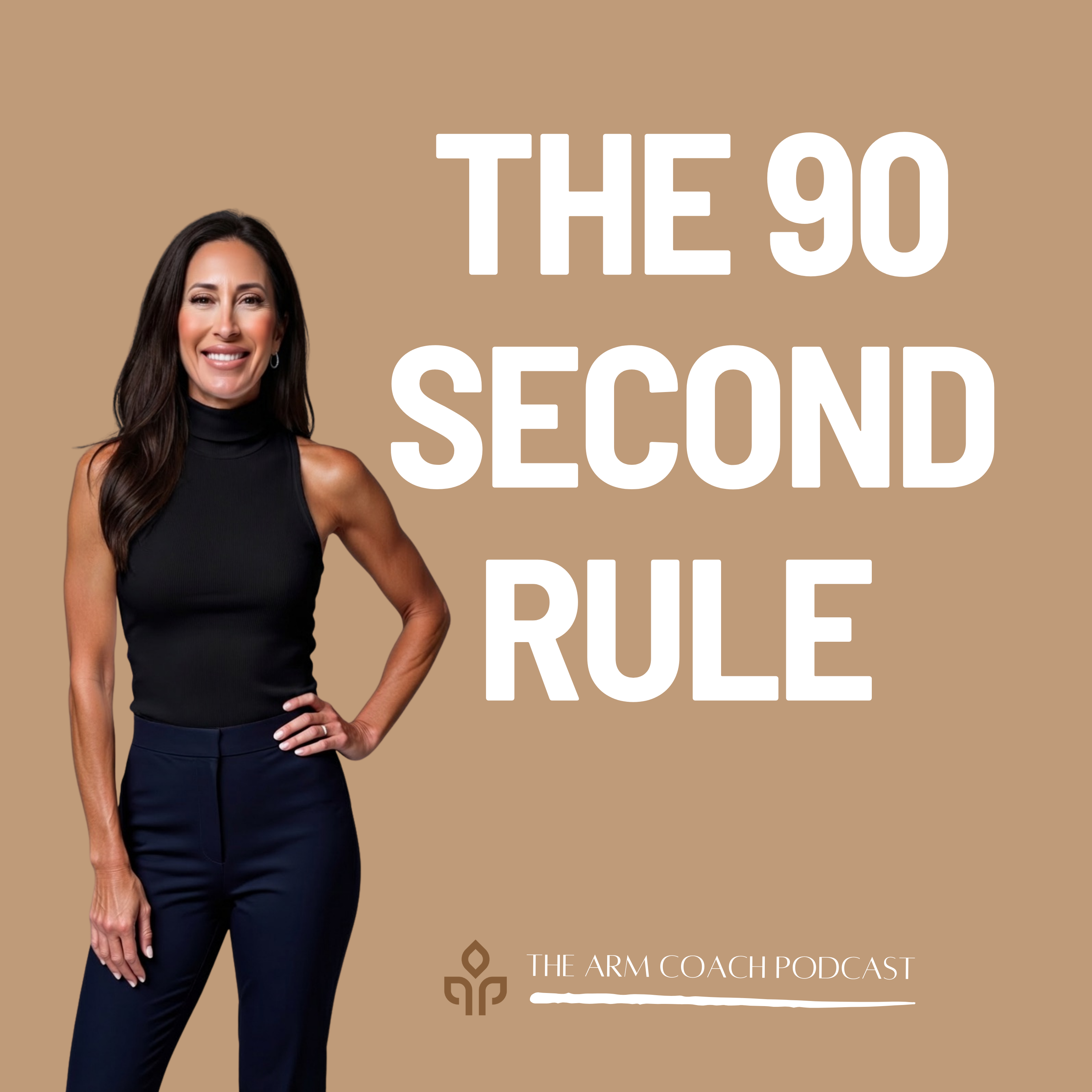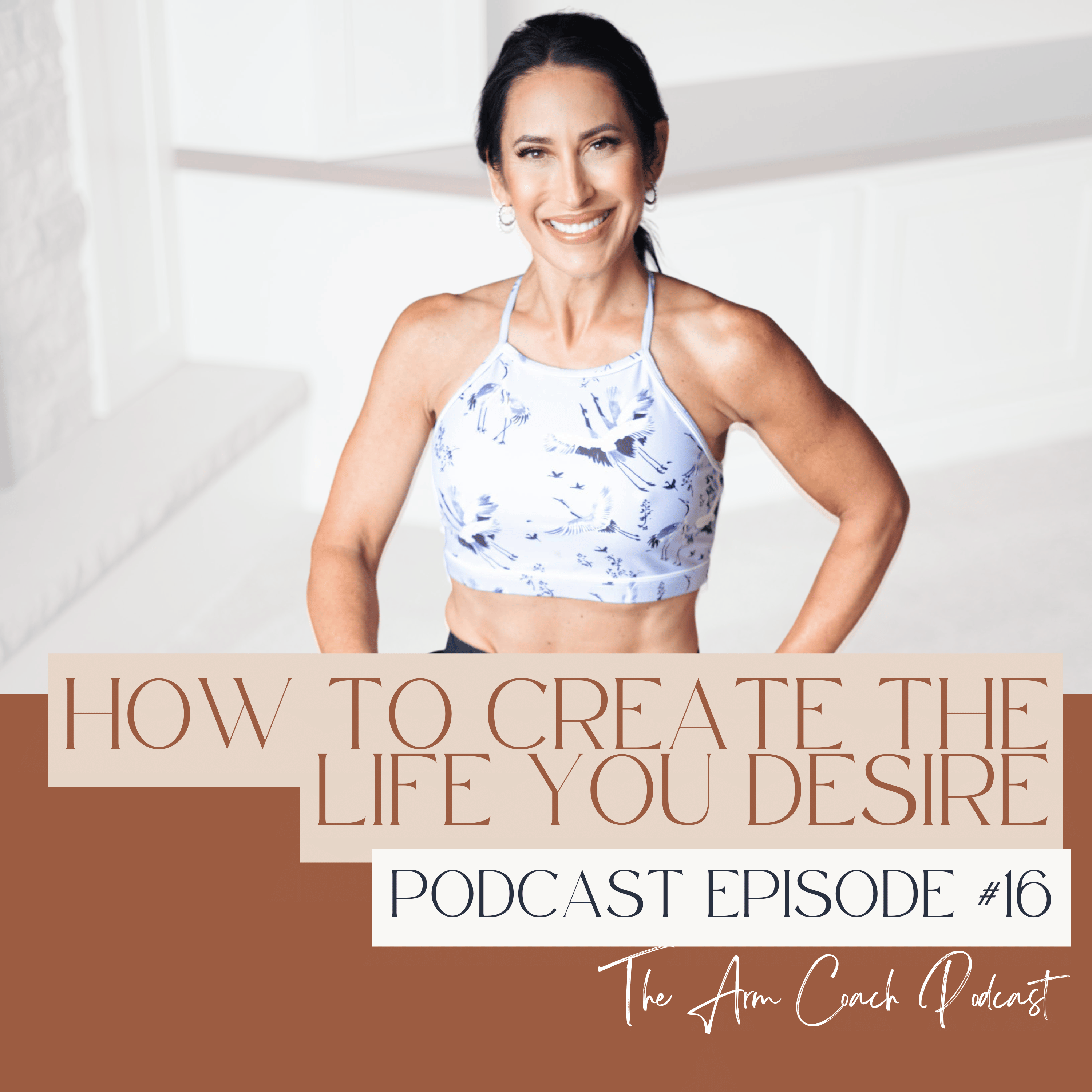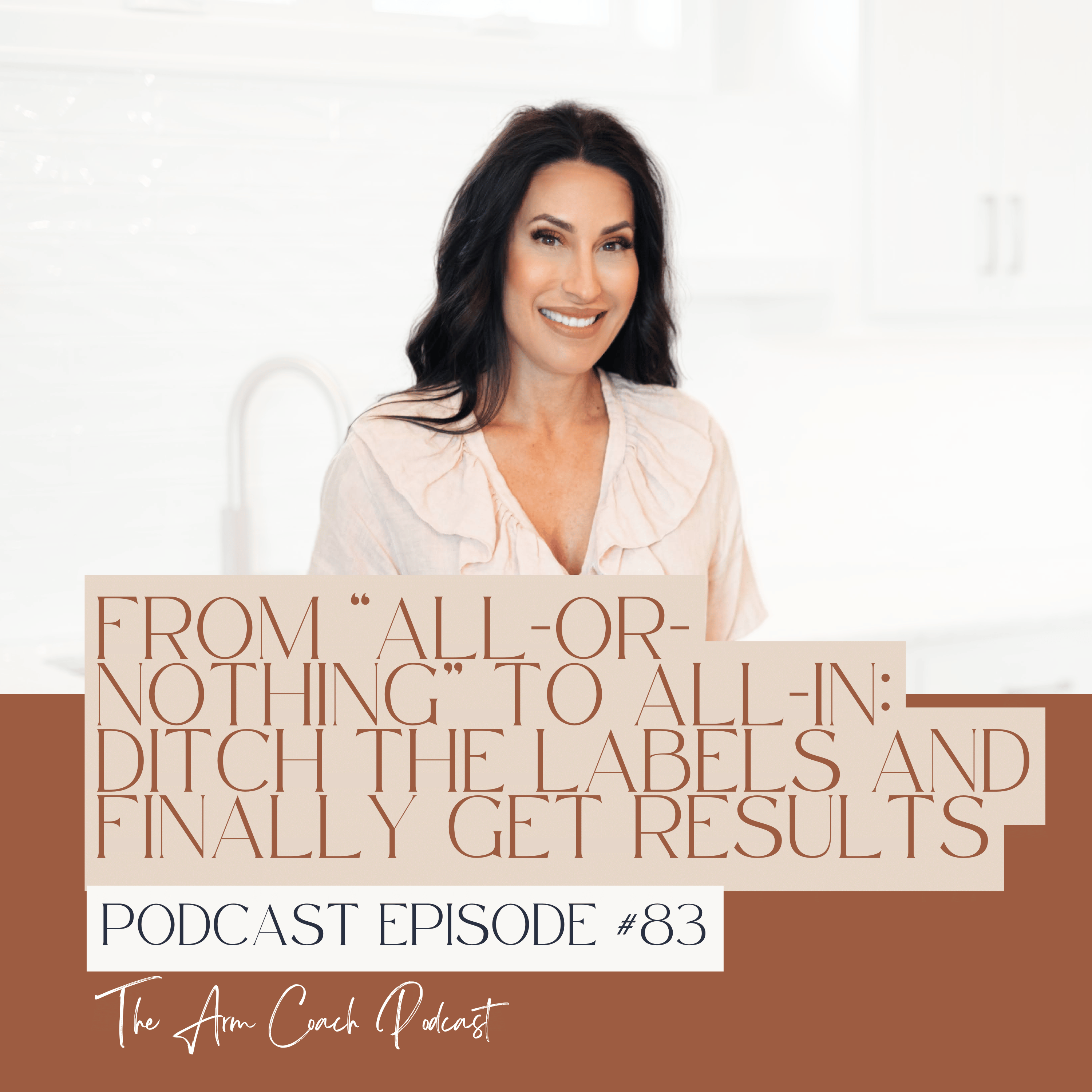Episode Transcript
The biggest question my clients have when they first come to me
is this: “What should I eat?”
And that is their biggest desire. They want to lose the fat and flab
on their arms, and they want me to tell them step by step exactly
what to eat to get to their goal of sculpted arms.
So in today’s episode, I want to talk to you about what to eat.
Hi, everybody, and welcome to The Arm Coach podcast, episode
#33.
Here's what we're going to talk about today. How do you eat
right now? How do you look at food? Do you look at it as good or
bad? And what does that perspective do for you? What's a more
helpful way to classify the foods you eat? And what that new
perspective might do for you, and how to put this into practice
and live it while you figure out what foods to eat.
So let's start with how you view food right now. You eat several
times a day and eating is not what I would consider optional,
right? So how you view your food determines what you actually
choose to eat. And that plays a really big part in what shows up
on your body. Right now, for most of you who struggle with
eating and weight, you may mentally divide food into two
categories. Good food and bad food. You tend to think of good
food as food that you're allowed to eat. You may think it's not
fattening, it's clean, it's fuel food, it's good for you. Maybe you
think it's healthy. And most importantly, it's what you were
allowed to eat. In this category, you might put salads, fruits,
veggies, protein, healthy fats and grains. Now, this is not my
classification. This is just how most people think of food. On the
other hand, food that you think of as bad food, is food that you
tend to classify as fattening. Maybe you think of junk food in that
category. Or unhealthy treat food. Or definitely forbidden things
that you consider forbidden for you. And in this category, some
examples of what you might put in there would be desserts,
baked goods, ice cream, fast food, candy. Again, this is not my
definition, just how most of you think of food. If this is how you
think about different foods, when you're trying to figure out what
to eat, there are the internal conversations that you have with
yourself that maybe you're not even aware of why you think of
food this way or where it came from, but we all have these
internal definitions. These opinions about different foods they
come from your childhood, and then they're modified by what
you read and learn about in your culture today. So maybe your
parents soothed you or rewarded you with special treat foods.
Most likely not veggies, not tuna salad. Maybe you have
memories of being upset about something, and getting a special
ice cream treat from your parent. Or maybe your early teachers
rewarded you for having the right answer. I was truly amazed
when my kids were in elementary school, how often the teachers
used candy to reward answering a question correctly. I remember
thinking that it was a little like dog training. Now of course, living
in the world we all live in today, you are surrounded by
advertising for all kinds of food. Mostly the package process
kind> Not too many commercials for asparagus, right? And now,
if you're a reader or you watch the latest news shows, you're
constantly hearing new opinions and new research results about
what foods are considered good and what foods you should stay
away from. Needless to say, it’s confusing. Because it changes
so much. No wonder so many of us would love someone to just
tell us what to eat. So from all these different sources, you've
developed your own system to classify foods. What's good and
what's not so good for you. You divide food into good bad,
allowed or forbidden, fuel or treat, healthy or unhealthy, and so
on.
Well here's what happens to most of us, when you have such a
strong division in your mind about how you look at food, because
if you see food as good or bad, then when you eat it, you too see
yourself as either good or bad. You not only develop this really
skewed version of food, but you also start looking at yourself as
good or bad, depending on what you ate. How many times have
you said to yourself, ‘oh I'm so bad, I just ate a whole bag of
chips’. Or ‘I can't believe I just ate sugar. I was trying to not eat
sweets and now I have to start all over again’. When I was in
dental hygiene school, I remember a classmate, an adult, who
literally said, ‘I just had a turkey sandwich with mayo, I should be
shot’. I promise you, this is literally what she said. Now granted,
I've never heard anyone use that language again, but all the time
I do hear clients, and women in my group say ‘I've been so bad’.
Sometimes I need to remind them that they're good people, they
just ate something that they wish they hadn't. When you think of
foods as good or bad, if you eat foods from the virtuous
category, then maybe you feel proud. You feel very in control.
Very confident about your other abilities based on your very
admirable control with food. On the other hand, when you're
dealing with foods from the forbidden category, you leave
yourself with two choices on how to see yourself. Number one, if
you do give in and eat these foods in the Forbidden category,
then you are also bad by association. And number two, if you
don't give in and eat these forbidden foods, then you are
deprived. You just can't win.
So maybe you start your day off by eating according to your
plan. Most likely something from the good food category. You're
feeling great about yourself. But then, since you're viewing foods
so black and white, and trying to be good, you probably will have
a slip and eat something from the bad food category. Suddenly
you hate yourself. You're no longer happy and proud and
peaceful. But this isn't because of who you are. It's only because
you're identifying yourself and your worth, and connecting it to
the food you have eaten. Which remember, isn't good or bad
itself, just the way you've gotten used to thinking about it.
So now that you can see a little more clearly what happens when
you divide the foods of the world into the good and bad
categories, here's another way to figure out what to eat. I'd love
for you to consider thinking of foods as either helpful or less
helpful. Helpful foods, usually give you good health. They give
you energy. They taste good, and they allow you to easily
manage your weight when you eat them in the right amounts,
which is that nice flow from a little hungry to a little full. Less
helpful foods aren't so supportive of good health. And maybe not
energy either. But that doesn't mean that they're forbidden from
your life. That means that the helpful foods are foods that you'll
more freely choose from. And of course, they should still be
delicious. But you'll feel good physically when you eat them. And
since most likely they are real foods, you won't have as much
trouble stopping when you've had enough. If you're eating mostly
helpful foods, and staying connected to your hunger level, then it
won't be so hard to stop when your body is lightly satisfied. I like
to think of these helpful foods as foods that you love, that love
you back. It's a little like choosing a friend or a partner. It feels so
much better if the relationship is balanced, and the person you
love, loves you back. Well, it is so much better for you if the
foods you love and eat most of the time, also love you back and
make you feel good when you eat them. Now less healthful foods
are foods that are strictly for pleasure, and entertainment. And as
you can imagine, your eating plan may have some of these foods
in it, but it won't be mostly composed of these foods, because
these foods are like treats. And the very nature of a treat, is that
it's something special. It's not what you give yourself 90% of the
day or the week. It's a small percentage of your main diet, just for
fun. When you look at foods this way it does several things. It
takes away that good and bad division, and therefore it takes
away the motivation to label yourself as good or bad. It allows
you to consciously choose a food that's not necessarily the most
helpful in the world, but you can consciously add it to your eating
plan, without telling yourself you've blown it. And now you may
as well keep eating. It also allows you to eat a wide variety of
foods. And the makeup of those foods is up to you. But when
you consciously choose to add in the less helpful foods, you're
still in the driver's seat. Moving back and forth from mostly
helpful foods to occasional trees of less helpful foods, gives you
a gentle rhythm. You feel good. You're in charge. You may
choose to keep a small amount of less healthful foods around,
simply because they taste delicious. But since you're in charge,
most of the time you decide to choose healthful foods that love
you back.
So, how do you take this concept into real life, and answer the
question, what should you eat? Well first, think about what you
want. How do you want to feel physically? What's happening
with your body right now, and your weight? How have your
previous choices affected you? If you're carrying around extra
weight and it bothers you, I want you to honestly ask yourself, is
it because of what you're eating, or how much you're eating.
Most of us believe that if we just ate the right foods, we'd be
effortlessly skinny. And that's why millions of diet books are sold
every year. But what you eat and how much you eat are two very
different things. And both matter. When you eat like a naturally
slim person, you're eating just enough to satisfy your hunger, and
you're stopping when you're comfortably satisfied, not full or
stuffed. You've heard me mentioned this several times, and I do
because it's the foundation of what I teach. But what you eat,
counts to, because what you eat, will either satisfy you and
nourish you, or it will take up valuable space in your body, not
nourishing you and not leaving room for the delicious, helpful
foods you need more of. I want to encourage you to eat mostly
helpful foods. And to allow yourself a little bit of less helpful treat
foods.
Now, I know what you're thinking. I know you want exact
numbers, counts, calories, carbs, percentages, I know that. But
since this is not a diet, and naturally slim women don't walk
around, weighing and measuring a Snickers bar. That's not what I
want to teach you. Most of your days should consist of foods
that are helpful. And you know exactly what they are. Roast
Chicken is a helpful food. And chicken Parmesan is more in the
less helpful, treat category. You know this. The foods that are
helpful are natural foods. Most likely they’re not processed,
they're not packaged. They don't have a lot of sugar or
chemicals or preservatives. And they don't have a lot of things
that essentially turn into sugar as your body processes them, like
white flour. If you eat these foods, the helpful foods, most of the
time, you will feel good. And it won't be much of a struggle to
stop when your body's had enough. If you eat mostly less helpful
foods, the sugary, white flour and processed foods, those foods
are literally created by food companies to make you crave more
and more and more, so that they could sell more. So, if that's the
bulk of your diet, you can see where your extra weight comes
from. Not only for meeting more than you need, either starting to
eat when you're not hungry, or continuing to eat beyond
satisfied, but also from eating more, because the foods
themselves create an artificial craving for more. So, if you like to
keep the less helpful foods in your world, and that's totally okay,
I'd like you to experiment and see just how a few bites a day feel.
Most helpful foods, and a few bites of less helpful foods. Some
people call them fuel food and treat foods. Some people call
them power foods and fun foods, Whatever you want to call
them is fine, but take away the good and the bad, and then you
decide.
So how do you know if what you're choosing is right, if it's
working? If you are eating from a little hungry to lightly satisfied,
and then it's fairly easy to stop, and you add in a small amount of
fun food, and can easily stop that, and if this way of eating allows
you to shed your extra weight, then you've got it. That's how you
know it's right. I think you can figure this out yourself. And I know
that the more you get comfortable with designing your own
eating plan based on these principles, the more likely it will be
that you're able to stick with it. The less likely it will be that you
will feel deprived. And the less you'll label yourself as either a
good or bad person if you aren't strictly following even your own
plan. So if you go over one day, and you eat more food than your
body needs, just get back up and get right on track, right away.
Same day. Not the next day. Not Monday. Not the first of the
month, and not after the new year. When you plan your food,
which I hope you’re taking the time to do, plan in what kind of
treat you'll give yourself and when, and put it into your eating
plan. And there is no guilt because you're in charge. And
experiment a little bit. See what foods feel hard to stop, as those
treat foods, and see what foods you're able to manage. I know
you'd like someone to tell you exactly what to eat. But that's
what hasn't worked for you for many years. What I hear from my
clients is that they've tried and failed so many diets, that the first
time they truly experienced the confidence from success, comes
when they create their own eating plan. So that is what I'd like
you to do. And let me know how it's going. I’ll post my email in
the comments. Thank you so much for joining me today. I am
truly happy to share what I know with you and I'm happy that
you're enjoying it. I love that you invite your friends to our group. I
tremendously appreciate and thank you. That's it for today.


